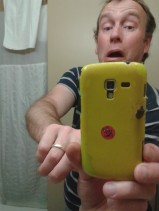Posted by Lloyd Stringer @lloydstringer2
The biosecurity landscape in NZ is undergoing change. It is shifting from government-led surveillance and responses to a shared response with industry. The Government Industry Agreement (GIA) enables partnerships between industry and government to manage pests allowing for agreement on, for example, decision-making and cost-sharing of responses to new pests and diseases before an incursion has occurred.
This coming together of government, industry and science was exemplified in a recent trip to investigate, share knowledge and trial new surveillance tools for Halyomorpha halys, the Brown Marmorated Stink Bug in Santiago, Chile.
Decent proposal- science engaging GIA: Lloyd Stringer (University of Auckland/ Plant & Food Research) kneeling with Matt Dyck (from Kiwi Fruit Vine Health, a GIA signatory) putting up a surveillance trap for the Brown Marmorated Stink Bug.
The delegation comprising members from the Ministry for Primary Industries, Kiwifruit Vine Health, New Zealand Wine, Horticulture New Zealand and Plant & Food Research shared their combined knowledge with the Chilean SAG (equivalent to MPI in NZ) and vice versa.
So far populations of Brown Marmorated Stink Bug have not been detected in New Zealand, but it is knocking on the door so the risk of incursion is great. Biosecurity is a shared responsibility, and it is great to see different organisations domestically and internationally sharing information so that all parties benefit from collaborative science and operational research.

Science helps to underpin surveillance, eradication and pest management programmes. Recent work done by Ecology Ngātahi members have helped to show how to speed up the confirmation that a species has been eradicated and estimate the probable effectiveness of eradication tools. As NZ becomes more familiar with GIA, I expect there to be many opportunities for science to take what we have learnt and apply it so that it can be more readily used to inform decision making to keep NZ relatively pest free.
So remember if you see something odd, catch it and call the MPI exotic pest and disease hotline 0800 80 99 66.

Lloyd Stringer is a BMSB-plagued PhD student at the School of Biological Sciences at the University of Auckland, and scientist in the Biosecurity Group and Plant & Food Research, Lincoln. He is trying to understand how populations and management tools interact for pest surveillance and eradication. He is supervised by Max Suckling, Jacqueline Beggs, and John Kean